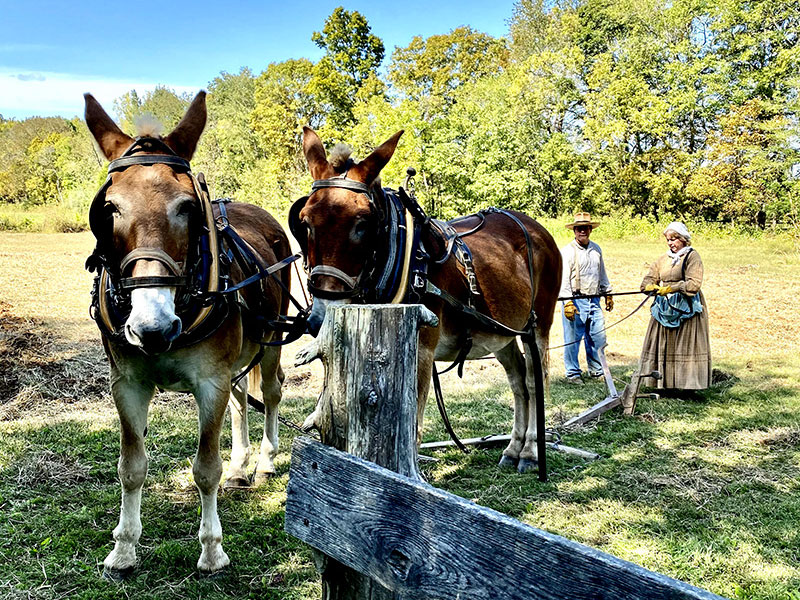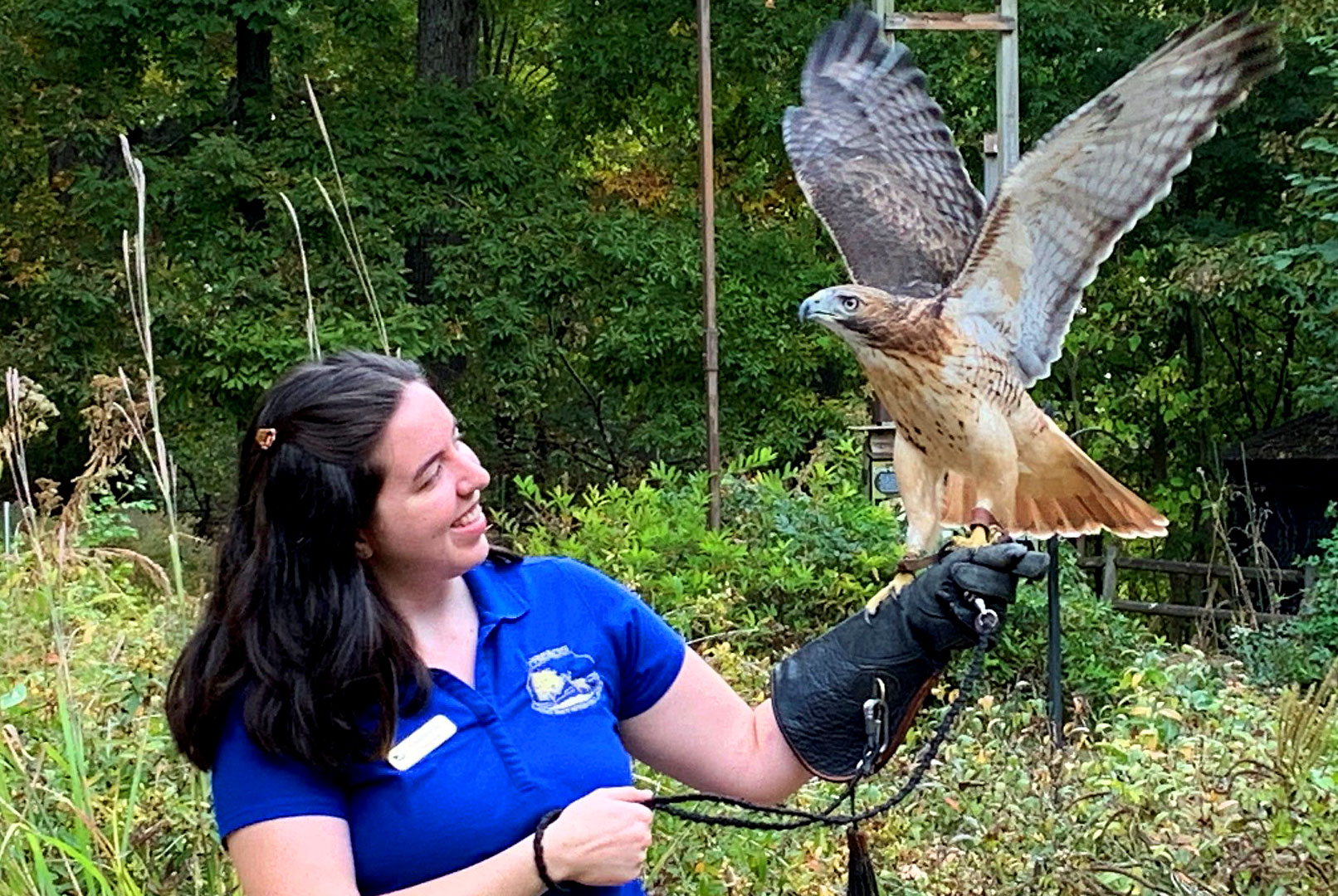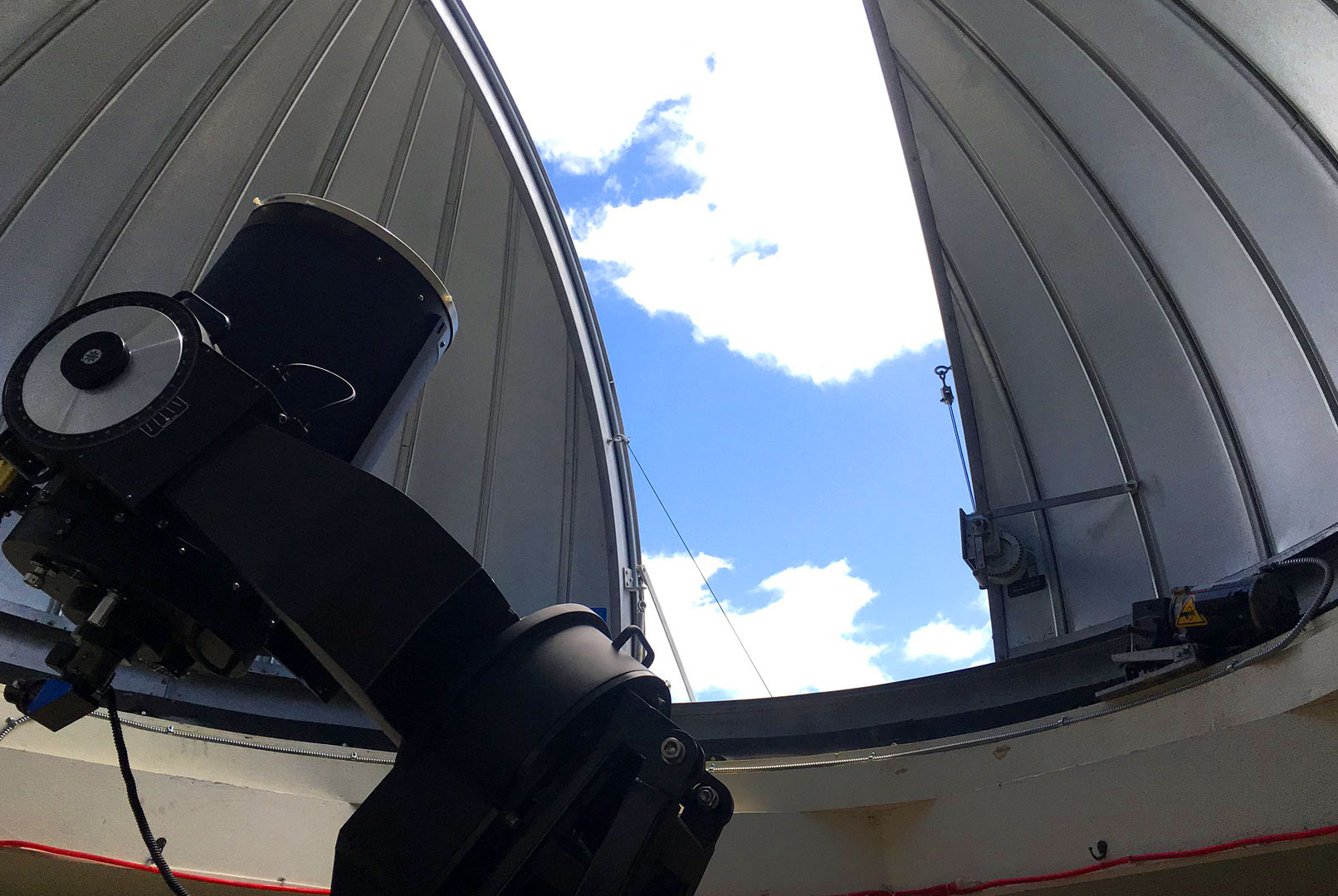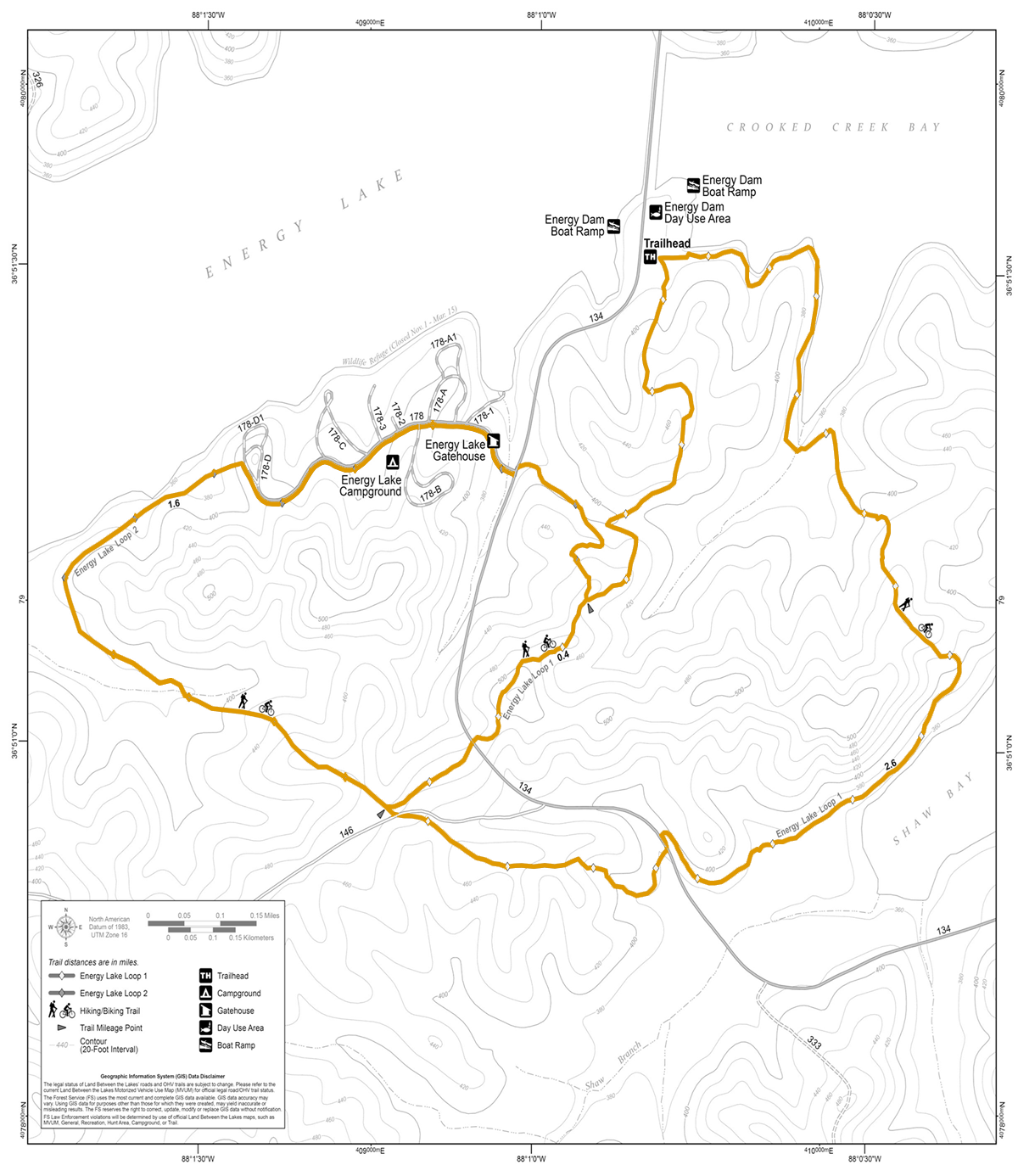Friends of Land Between the Lakes
Attractions Programs
With over 170,000 acres of fields, streams, woods, and ponds, Land Between The Lakes National Recreation Area is the perfect destination for students to explore and learn.
Day Use Attractions Education Programs
Reservations Information: The following programs are offered to pre-scheduled groups throughout the operating season (March 1-November 30). Programs vary in length and differ in costs. During December, January, and February, programs are offered on a limited basis by reservation. We recommend you schedule your group at least one week in advance. Reservations are first-come, first-served basis.
For reservations, cost, and other information, call our group scheduler at 270-924-2020, 8am – 4:30pm, Monday through Friday.
Minimum group size is 10 paying participants.

Give your students a view of life in 1850’s western Tennessee and Kentucky with a visit to The Homeplace 1850s Working Farm. Heritage breeds of livestock and heirloom plants are featured in the fields and gardens. Watch and participate in the daily chores and activities of the pre-Civil War era.
Your students will leave with a much better appreciation of what it took to live in bygone days, and The Homeplace staff will be glad to assist you in developing a program that meets your educational plan.
The Homeplace is a member of the National Association for Interpretation and the Association of Living History, Farm and Agricultural Museums.
Homeplace 1850s Program Listing
SELF-GUIDED TOUR OF THE FARM
Pre-K through adult. $3 per participant.
Step back in time to the mid-19th century and stroll on your self-guided tour through a middle Tennessee yeoman class family farm.
Farm activities change with the season. Your group can observe, ask questions, and occasionally lend a helping hand to Homeplace interpreters.
This tour is available to groups of 30 or less, making it ideal for home educators and small groups.
SHOW & TELL HISTORY
All Ages. $3 per participant.
Discover what daily life on a mid-19th century farm was like by visiting with interpreters at various stops as you tour the farm.
You will get a chance to talk about the different roles of people on the farm, discover some of the many uses for the crops and animals raised on the farm, and discover how heavily people depended on natural resources in their daily life.
TOYS AND GAMES
K through 2nd grade. $3 per participant.
What did children do for fun before the age of television and Playstation?
Discover toys that were made at home and learn some games that taught the children skills while they played.
CHILDREN’S CHORES
K through 2nd grade. $3 per participant.
“No playing until you finish your chores.”
Who hasn’t heard that before? For children of the mid-19th century, this was a necessity. Not finishing their chores meant the family might go without water or firewood.
Help us finish up the day’s chores!
SPINNING WOOL
K through 12th grade. $3 per participant.
Discover the process of how wool is turned into yarn. There are many steps and skills necessary to make yarn; including shearing, cleaning, carding, and spinning.
Watch these demonstrations and try your hand at spinning.
A WALK WITH THE ANIMALS: ENDANGERED ANIMALS?
3rd through 12th grade. $3 per participant.
When you think of endangered animals, what comes to your mind?
Pandas, spotted owls, blue whales? What about chickens, sheep, and pigs?
Go on a guided tour to see the farm animals on and learn about endangered farm animals.
WORKING WITH WOOD
3rd through 12th grade. $3 per participant.
Wood was a tremendous resource on a farm, used in everything from the family house, to fences around their crops, to chairs they sat in, to tools used on the farm.
We will discuss wood as a resource, as well as demonstrate the use of some of the tools that would be used on a farm in the mid-19th century. Try your hand at splitting a rail!
HORSE AND OX POWER
3rd through 12th grade. $3 per participant.
In the days before tractors, horses and oxen provided power to work the land. Discover benefits and limitations of these two animals by observing them and the equipment they use.
You will also get a chance to find out how important teamwork and trust are when working with these animals by taking a turn in the harness yourself!

The Woodlands Nature Station has a wonderful mix of live animal displays and static exhibits around which you can easily build an educational message about the environment, resource conservation, animal life histories, and much more.
Our staff of seven interpretive naturalists will be more than happy to work with you to develop a program that will meet your specific needs and achieve your educational goals.
Woodland Nature Station is a member of the National Association for Interpretation.
On-site Outreach Programs
The Nature Station also offers outreach programs that bring the wildlife to your school or organization.
Woodlands Nature Station Program Listing
INCREDIBLE INSECTS
Pre-K through 6th grade. $3 per participant.
Students will get an up-close,hands-on look at several species of insects and other invertebrates.
Topics include life cycles, metamorphosis, anddistinguishing characteristics of insects.
After gaining a new appreciation for these not-so-creepy crawlies, students will have time to explore nature.
A WALK THROUGH NATURE: SELF-GUIDED BACKYARD TOUR
Pre-K through adult. $3 per participant.
Step into the world of nature on a self-guided visit to explore our native wildlife exhibits, gardens, and indoor displays.
Use your observation skills as you encounter owls, a bald eagle, a bobcat, turtles, and other resident wildlife during your stroll through Nature Station.
TRIPLE CREATURE FEATURE: REPTILE, MAMMAL, AND BIRD, OH MY!
Pre-K through adult. $3 per participant.
Students will experience up-close encounters with a bird of prey, a reptile, and a mammal.
The group leader can choose a theme for the animal encounters: adaptations, habitats, roles in the food chain, or wildlife conservation.
This is a good option for large groups (over 80 students) or groups that have limited time.
PUPPET SHOW: THE LORAX
Pre-K through 2nd grade. $3 per participant.
Dr. Seuss’s favorite tale of The Lorax will come alive for children during this entertaining puppet show that teaches about the value of trees.
Students will also enjoy an up-close encounter with an animal that uses trees, as well as take part in a tree-related activity.
Program includes time to explore the Nature Station’s live animal exhibits.
PUPPET SHOW: ANIMALS OF THE FOREST
Pre-K through 2nd grade. $3 per participant.
Children will discover the world of the forest and the animals that live there during this engaging program.
Through an interactive puppet show, an up-close encounter with a live animal, and more, students will learn about the many animals that live in the forest.
PUPPET SHOW: ANIMALS OF THE POND
Pre-K through 2nd grade. $3 per participant.
Children will discover the world of a pond and the creatures that live there during this engaging program.
Through an interactive puppet show, an up-close encounter with a live animal, and more, students will learn about the many animals that live in a pond.
BACKYARD SAFARI: SENSORY ADVENTURE
K through 2nd grade. $3 per participant.
Your senses will come alive as we investigate the world of animals during a guided sensory walk through the backyard wildlife exhibits.
Students will smell, touch, look and listen as they discover how both people and animals use their senses.
NATURE HIKE: ANIMAL SIGNS & CLUES (1 mile)
K through 6th grade. $4 per participant.
Your students will use their senses, make observations, and take part in staff-led activities as we explore the trail for animal signs during this 1-mile (or less) hike.
We will learn how wildlife survive in their habitat by examining their homes, food remains, tracks, and other clues they leave behind.
POND PROWL
K through 6th grade. $4 per participant.
Are you ready to “dip in” and search the wet, the muddy, and the mysterious?
Your students will use dip nets and magnifiers to explore life in a pond and learn about the adaptations, behaviors, and life cycles of the tiny creatures that live in this habitat.
NATURE HIKE: PLANT PATROL (1 mile)
2nd through 6th grade. $4 per participant.
Let’s go for a guided nature hike to explore the world of plants. Through activities and observations, we will examine the differences among types of plants, their adaptations for survival and reproduction, what the parts of plants do, and how wildlife depend on plants for survival.
BACKYARD SAFARI: SECRETS OF SURVIVAL
2nd through 6th grade. $3 per participant.
Animals have all the tools they need to protect themselves, find food, and survive within their habitats.
Students will observe wildlife in our backyard and learn about the exceptional adaptations many animals use in their survival!
IN COLD BLOOD
2nd grade through adult. $3 per participant.
Enjoy this up-close encounter with live reptiles and amphibians!
For younger groups, the program will focus on adaptations, life cycles, and classification.
With older groups, we will also explore how environmental changes have affected these animals and learn about their unique behaviors.
FINE FEATHERED FRIENDS
3rd through 6th grade. $3 per participant.
Explore bird adaptations during this interactive, hands-on program.
Students will meet a live owl while exploring the concept of adaptations. Then students will work in groups to create their own imaginary bird with adaptations to survive in its habitat.
Finally,they will explore the backyard wildlife ex?hibits by doing an animal adaptations scavenger hunt.
BACKYARD SAFARI: ANIMALS, ART, AND WRITING
3rd through 6th grade. $3 per participant.
Nature Station wildlife and plants are perfect for creative inspiration! This guided tour of the backyard includes fun language and arts activities.
Students will observe, reflect, and communicate by writing and drawing from their experiences.
BACKYARD SAFARI: WILDLIFE CONSERVATION
6th grade through adult. $3 per participant.
What is wildlife? What is conservation? How do environmental changes and human activities affect wildlife?
As we introduce your students to our resident wildlife, we will explore these questions.
Students will develop a greater understanding of how a variety of factors can cause changes to wildlife populations and the ecosystem as a whole.
CAREER DISCOVERY: NATURAL RESOURCE INTERPRETATION
High school through adult. $3 per participant.
Our job at the Nature Station is “interpretation.” We work to foster understanding, appreciation, and responsible use of the natural resources of Land Between The Lakes.
During this tour of our nature center, we will introduce your students to the field of interpretation – its purposes, methods, and role in natural resource management.

The Golden Pond Planetarium and Observatory offers a wide range of planetarium shows that are suitable for all grade levels. Take advantage of regularly scheduled shows or contact the Planetarium Manager about scheduling a specific presentation for your group.
Programs of sky observation at the Golden Pond Observatory can be scheduled by contacting the Planetarium.
All of our programs correlate with Kentucky and Tennessee educational standards.
The Golden Pond Planetarium is now a NASA Educator Resource Center. Contact us at 800-455-5897 about how you can receive educational materials provided by NASA.
Golden Pond Planetarium Program Listing
LITTLE STAR THAT COULD
$2.50 per participant.
“Little Star That Could” is a story about an average yellow star in search for planets of his own to protect and warm.
Along the way, he meets other stars, learns what makes each star special, and discovers that stars combine to form star clusters and galaxies. Eventually, Little Star finds his planets.
Each planet is introduced to the audience with basic information about our Solar System.
Program time – 35 minutes plus interpretive presentation.
EARTH, MOON, & SUN
$2.50 per participant.
This show explores the relationship between the earth, moon and sun with the help of Coyote, an amusing character adapted from Native American oral traditions who has many misconceptions about our home planet and its most familiar neighbors.
Learn why the sun rises and sets and the basics of fusion and solar energy. Examine the moon’s orbit, craters, phases and eclipses.
Also, explore past and future space travel to our Moon and beyond.
Program time – 25 minutes plus interpretive presentation.
SKIES ABOVE
$2.50 per participant.
An interpretive program presenting what is visible in the night sky. The visitor will learn what constella?tions are visible during the current season. They will also learn about planets,the moon, and other objects that may be visible. This is a very informative and fun program for all ages. All dome presentation.
Program time – 45 minutes.
IBEX: SEARCH FOR EDGE OF SOLAR SYSTEM
$2.50 per participant.
This program follows the creation of NASA’s Interstellar Boundary Explorer. Audiences will get an in-depth look at the mission and how IBEX is collecting high-speed atoms to create a map of our Solar System’s boundary.
Narrated by two inquisitive teenagers, audiences will hear from the scientists and engineers that developed the IBEX mission and created the spacecraft, and get the latest updates on the mission’s discoveries.
They will also learn about the discoveries of Galileo, Huygens, Newton, Hubble and many others. Full dome presentation.
Program time – 31 minutes plus interpretive presentation.
TWO SMALL PIECES OF GLASS
$2.50 per participant.
While attending a local star party, two teenage students learn how the telescope has helped us understand our place in space and how telescopes continue to expand our understanding of the universe.
They also learn about the discoveries of Galileo, Huygens, Newton, Hubble and many others.
Program time – 25 minutes plus interpretive presentation.
LEGENDS OF THE NIGHT SKY
$2.50 per participant.
Join Aesop the owl and Socrates the mouse for a light-hearted and imaginative look at the myths and stories associated with the constellations.
This show features the mighty warrior Perseus, the beautiful princess Andromeda and Cetus, the terrible sea monster.
Program time – 30 minutes.
BACK TO THE MOON FOR GOOD
$2.50 per participant.
Immerse yourself in a race to return to the Moon forty years after the historic Apollo landings.
See how a competition among privately funded international teams is ushering in a new era of lunar explorations and learn about the moon’s resources.
Program time – 30 minutes.

The 3-mile drive through the Elk & Bison Prairie will take your class back to a time before European settlement of the area when elk and bison were common in western Kentucky. Students can imagine life as the Native Americans would have experienced it.
The Elk & Bison Prairie affords a perfect venue to teach how the elk and bison, along with other game, were the primary sources of food, clothing, materials for tools and weapons, and even fuel. Observe remnant populations of warm season grasses; the native plant community of that time, which are being restored in this area.
With interpretive stops along the route that tell the story of the land, vegetation, wildlife, and people who inhabited Kentucky’s barrens, the Elk & Bison Prairie offers a unique learning opportunity to your students.
Overnight Facility Education Programs
Let our professional staff help you plan your 2-, 3-, or 4-day trip to LBL and the surrounding area. Give us a call at 270-924-2044 or email lblinfo@ fs.fed.us to learn more about the total experience LBL has to offer. Discounted rates are available during the winter months and for first-time groups. Reservations are taken up to one year in advance.

Overnight Facility
Why turn around and head back to school just when your students are starting to really enjoy the learning opportunities LBL has to offer?
With 128 beds, cafeteria, meeting rooms, recreational activities, and a full array of programs to complement your educational goals, Brandon Spring Group Center is the perfect companion to our day-use facilities. Imagine the lights turning on in students’ minds when they wade in a nearby creek to observe a crawfish in its natural habitat, learn to read a map and compass, and more. These and countless other learning adventures await you and your students.
Let our professional staff help you plan your 2-, 3-, or 4-day trip to LBL and the surrounding area.
Give us a call at 270-924-2044 or email lblinfo@ fs.fed.us to learn more about the total experience LBL has to offer.
Discounted rates are available during the winter months and for first-time groups. Reservations are taken up to one year in advance.
Brandon Spring Program Listing
STREAM STUDY
Put on your get-wet shoes and prepare to explore the diversity of life found in a stream ecosystem.
Your students will conduct a scientific investigation by collecting and identifying aquatic invertebrates using dip nets, discovery scopes, and field guides.
As we wade through the ripples of Panther Creek, we’ll discover the unique adaptations many aquatic organisms use for surviving in a constantly changing environment. Learning concepts: Life cycles, metamorphosis, interdependence, adaptations, food chains, biodiversity.
ORIENTEERING
Test your skills with a map and compass to navigate through the woods surrounding Brandon Spring.
We’ll study the parts of a compass, learn basic map-reading skills, and practice simple orienteering techniques.
Then work together in small teams and use our new found knowledge, along with some coaching from our staff, to find our way through the forest.
Learning concepts: Using geographic tools, identifying geographic features, critical thinking, decision-making skills, working in small groups.
POND PROWL
Your students will explore life in a pond habitat and discover the diversity of aquatic invertebrates and amphibians that call wetlands their home.
We’ll examine the many adaptations organisms have for surviving in an aquatic environment, with dip nets, discovery scopes, and field guides.
Learning concepts: Life cycle, metamorphosis, interdependence, adaptations, food chains, biodiversity.
CHALLENGE COURSE
Through creative teamwork, your group will solve a series of challenges on our low-ropes course led by trained facilitators.
See self-esteem and leadership skills grow while bringing the group together as an effective unit.
This is a great time to strengthen friendships, build a team, and learn a variety of life skills as you complete each challenge.
Learning concepts: Leadership, problem solving, sportsmanship, critical thinking, decision-making skills, teambuilding skills, communication.
ANIMAL SIGNS
Get ready to explore and “track” many animals that call our forests and shorelines home!
We’ll discover signs of wildlife often left behind, and see why all of our animal neighbors are important for maintaining a healthy environment.
We’ll search the woods, the fields, and along the water’s edge for those telltale signs of animals.
Learning concepts: Interdependence, biodiversity, habitat needs, observation skills.
BEAVER MARSH STUDY
Let’s discover what life is like for a beaver and investigate an active beaver marsh!
We’ll “build-a-beaver” and study beaver’s special adaptations up close, as well as examine why beavers are so important in our environment.
Then hike to a nearby beaver marsh to explore and identify the unique signs made by these amazing animal engineers.
Learning concepts: Interdependence, adaptations, habitat needs.
OUTDOOR SURVIVAL
It is always helpful to learn basic outdoor survival skills.
Let’s discover what to pack in a survival kit to take on a hike, and then head to the woods and build our own survival shelters using only items found in nature.
Along with building debris huts, we will practice simple ways to start a safe campfire!
Learning concepts: Critical thinking, decision-making skills, working in small groups.
LIFE ON A LOG
What good are dead trees?
This program investigates this question while we discuss life cycle of a tree and why trees are important.
Students will search for decaying logs, and discover unique life found in and under these micro-habitats.
We will collect a variety of organisms found on logs, identify them with field guides, and discover their unique adaptations for survival.
Learning concepts: Life cycles, interdependence, adaptations, food chains
LAKE STUDY
A time of exploration and discovery awaits your students on this pontoon boat excursion.
As a team of scientists, we’ll conduct a scientific investigation to determine the water quality of Bards Lake.
We’ll begin our investigation along the shoreline by collecting and identifying fish with a 45-foot seine net.
Then we’ll take to the water aboard our pontoon boat and conduct a variety of water quality tests.
Learning concepts: Scientific inquiry, conducting investigations, interdependence
NIGHT HIKE
Are you ready to become nocturnal for a night?
Explore the world of nocturnal creatures by taking a guided hike through the woods.
We’ll discover the unique adaptations that many nocturnal animals have for surviving in the nighttime world.
See, smell, hear, touch, and taste like the animals of the night!
Learning concepts: Adaptations, interdependence, habitat needs
NIGHT FLIGHT
It’s a bird! It’s a plane!
No!
It’s… a bat?!
We’ll unravel some bat myths and discover just how beneficial these flying mammals are to our environment.
Then, play our interactive echolocation game where you can be the bat!
Learning concepts: Interdependence, adaptations, food chains
ASTRONOMY
Have you ever looked up at the stars and became lost with wonder?
Learn the different constellations that make up the night sky and explore our solar system with some cosmic games that are out of this world!
Learning concepts: Lunar cycle, planetary motions and size, constellations
OTHER TOPICS BY SPECIAL REQUEST
Birds, Deer, Erosion, Insects, Predator/Prey Relationships, and Squirrels


